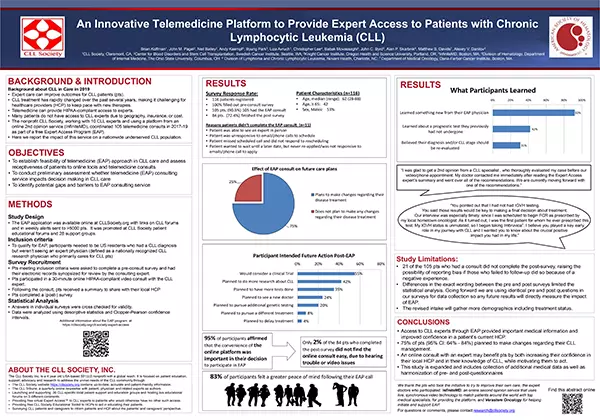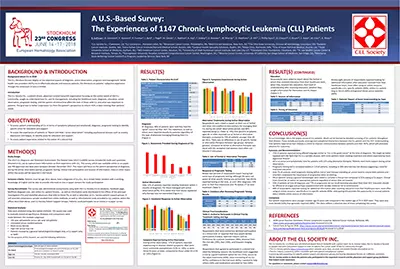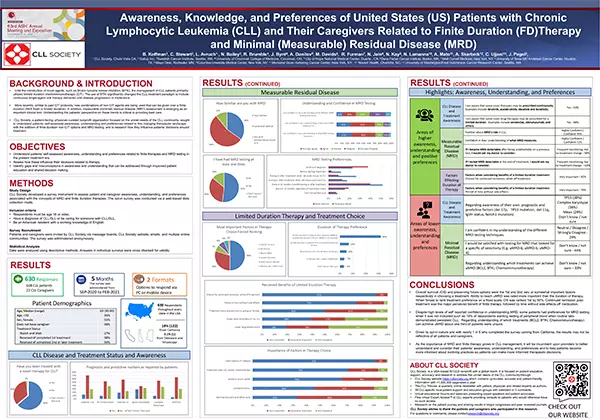Scientific Publications
Scientific Publications
CLL Society publishes original research in peer-reviewed journals and presents abstracts at major professional cancer conferences to advance the understanding of CLL / SLL. We have primarily focused on research to help study and explain the patient perspective to healthcare professionals, but are currently expanding the scope of our research efforts.
FEATURE
This was, to our knowledge, the largest survey ever done canvassing CLL patients. Its results were so significant and broad that it was necessary to report the data in three separate posters presented to hematologists and oncologists at three major annual conferences, ASH, EHA and ASCO. The EHA poster and data are featured here: A US-Based Survey: The Experiences of 1147 CLL Patients.
HELPFUL ARTICLES AND ABSTRACTS
- ASH 2022: Dr. Brian Koffman on Understanding Patient Preferences for Chronic Lymphocytic Leukemia (CLL) Treatments
- Are We Speaking the Same Language? Insights from a Patient and Provider Survey on CLL (Chronic Lymphocytic Leukemia)
- ASH 2021: Dr. Brian Koffman on Awareness, Knowledge, and Preferences of Patients with Chronic Lymphocytic Leukemia (CLL) and Their Caregivers Related to Finite Duration Therapy and Measurable Residual Disease
- IMPACT OF CLL SOCIETY’S (CLLS) FREE EXPERT ACCESS PROGRAM (EAP) FOR CHRONIC LYMPHOCYTIC LEUKEMIA (CLL) PATIENTS (PTS) May 18, 2020. Our abstract was published for the virtual version of the 25th EHA (EUROPEAN HEMATOLOGY ASSOCIATION) Annual Congress and is available to be viewed now. We present the before and after consultation data from our Expert Access Program that provides a free online consultation with a CLL expert from the…
- COVID-19 Vaccine Refusal and Fair Allocation of Scarce Medical Resources JAMA (April 8, 2022)- comment
- A Survey of European Chronic Lymphocytic Leukemia (CLL) Patients’ and Caregivers’ Awareness, Preferences, and Understanding Related to Finite (Limited) Duration Therapy and Minimal Residual Disease (MRD), Lecture and Abstract, Sept. 19, 2021
- Vaccinated, Unprotected, and Unaware of the Risk JAMA (June 24, 2021)
- Management of CLL Patients Early in the COVID-19 Pandemic: An International Survey of CLL Experts American Journal of Hematology, April 30, 2020
- Do our expectations for CAR T cell therapy outweigh the facts? Patient Perspectives on CAR-T gaps and challenges EHA Library. Koffman B. 06/15/19; 27419
- A US-Based Survey: Factors That Influence Treatment Decision-Making from the Perspectives of 1147 Chronic Lymphocytic Leukemia (CLL) Patients 2018 ASH abstract
- Not so crystal clear: observations from a case of crystalline arthritis with cytokine release syndrome (CRS) after chimeric antigen receptor (CAR)-T cell therapy October 2018 Bone Marrow Transplantation (This article is behind a paywall) https://www.nature.com/articles/s41409-018-0357-4
- The 21st century revolution in CLL: Why this matters to patients Best Practice & Research Clinical Haematology Volume 29, Issue 1, March 2016, Pages 122-132 (This article is behind a paywall) https://www.sciencedirect.com/science/article/abs/pii/S152169261630010X?via%3Dihub
- CLL Society Poster Presentation from ASH 2016
April 5, 2017. Factors That Influence Patient Treatment Decision Making in the Era of Novel Agents: An Internet-Based Survey of 281 Patients with CLL 2016 ASH abstract:




















